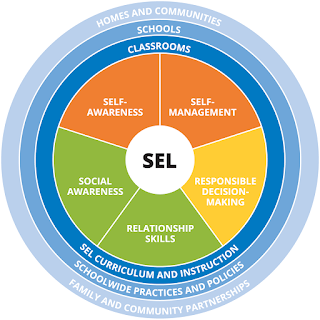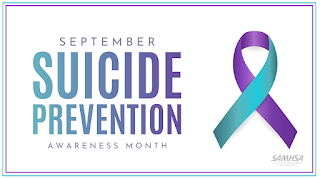Positive Outcomes for Social-Emotional Learning (SEL)
The idea of Social-Emotional Learning (SEL) isn't new, but it has gained traction and attention in recent years, as more research has validated the benefits of incorporating SEL into our classrooms and schools.
The Collaborative for Academic, Social, and Emotional Learning (CASEL) defines SEL as a "process through which children and adults acquire and effectively apply the knowledge, attitudes, and skills necessary to understand and manage emotions, set and achieve positive goals, feel and show empathy for others, establish and maintain positive relationships, and make responsible decisions." While some of that may seem like common sense, having an established framework with an emphasis on SEL ensures that all of students have the opportunity to acquire and practice these skills. CASEL has produced this graphic to explain their concept of SEL:
In this article from The Atlantic, the author shares observations from her visit to Austin High School, where SEL has been incorporated into the students' daily schedules and activities.
The author reports on two research studies that support the benefits of SEL. One meta-analysis from 2011 reveals "an 11 percentile gain in academic achievement for students who participated in a well-implemented SEL program versus students who didn’t." And the benefits aren't just related to academic success: a 2015 cost-benefit analysis from Columbia University "demonstrated a roughly $11 benefit for every $1 spent on a rigorous SEL program." As the author notes, "Just about every way to measure student success shows SEL can work." In fact, the high school visited by the author reports that their "discipline referral rates have been cut in half, and graduation rates are at an all-time high." It's hard to ignore such positive outcomes in so many areas of student performance.
The Collaborative for Academic, Social, and Emotional Learning (CASEL) defines SEL as a "process through which children and adults acquire and effectively apply the knowledge, attitudes, and skills necessary to understand and manage emotions, set and achieve positive goals, feel and show empathy for others, establish and maintain positive relationships, and make responsible decisions." While some of that may seem like common sense, having an established framework with an emphasis on SEL ensures that all of students have the opportunity to acquire and practice these skills. CASEL has produced this graphic to explain their concept of SEL:
In this article from The Atlantic, the author shares observations from her visit to Austin High School, where SEL has been incorporated into the students' daily schedules and activities.
The author reports on two research studies that support the benefits of SEL. One meta-analysis from 2011 reveals "an 11 percentile gain in academic achievement for students who participated in a well-implemented SEL program versus students who didn’t." And the benefits aren't just related to academic success: a 2015 cost-benefit analysis from Columbia University "demonstrated a roughly $11 benefit for every $1 spent on a rigorous SEL program." As the author notes, "Just about every way to measure student success shows SEL can work." In fact, the high school visited by the author reports that their "discipline referral rates have been cut in half, and graduation rates are at an all-time high." It's hard to ignore such positive outcomes in so many areas of student performance.




Comments
Post a Comment